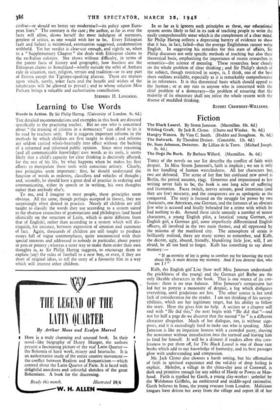Learning to Use Words
Words in Action. By Sir Philip Hartog. (University of London. 8s. 6d.)
THE detailed recommendations and examples in this book are directed specifically to the practising teacher. But no one who is concerned about "the training of citizens in a democracy" can afford to let it he read by teachers only. For it suggests important reforms in the methods by which children are first taught to think ; and reforms are seldom carried whole-heartedly into effect without the backing of a reformed and informed public opinion. Since most reasoning (and all communicable knowledge) uses words as its tools, it seems likely that a child's capacity for clear thinking is decisively affected, for the rest of his life, by what happens when he makes his first efforts to manipulate these tools with conscious artistry. Clearly, two principles seem important : first, he should understand the function of words as orderers, classifiers and vehicles of thought ; and, secondly, he should have a great deal of practice in ordering and communicating, either in speech or in writing, his own thoughts rather than anybody else's.
To me, and I imagine to most people, these principles seem obvious. All the same, though perhaps accepted in theory, they are surprisingly often denied in practice. Nearly all children are still taught to classify the words they use according to a system suited to the abstruse researches of grammarians and philologists (and based idiotically on the structure of Latin, which is quite different from that of English), rather than according to a system which will dis- tinguish, for instance, between expression of emotion and statement of fact. Again, thousands of children are still taught to produce essays full of vague commonplaces, quite unconnected with their special interests and addressed to nobody in particular, about poetry or pets or pottery ; whereas a surer way to make them order their own thoughts is, as Sir Philip Hartog suggests' to encourage them to explain (say) the rules of football to a new boy, or even, if they are short of original ideas, to tell the story of a favourite film in a way which will interest other children. In so far as it ignores such prinoiples as these, our educational system seems likely to fail in its task of teaching people to write the .easily comprehensible sense which is the complement of a clear mind. Sir Philip Hartog collects a depressing battery of evidence to show that it has, in fact, failed—that the average Englishman cannot write English. In suggesting his remedies for this state of affairs, Sir Philip discusses not only specific methods of teaching but also their theoretical basis, emphasising the importance of recent researches in semantics—the science of meaning. These researches bear closely on the whole problem of clear thinking ; and Sir Philip's sketch of the subject, though restricted in scope, is, I think, one of the best short outlines available, especially as it is remarkably comprehensive in its references. It is this theoretical basis which should appeal to the layman ; or at any rate to anyone who is concerned with the chief problem of a democracy—the problem of ensuring that the majority of its electorate shall not infest the whole system with the disease of muddled thinking.
RUPERT CRAWSHAY-WILLIAMS.


































 Previous page
Previous page